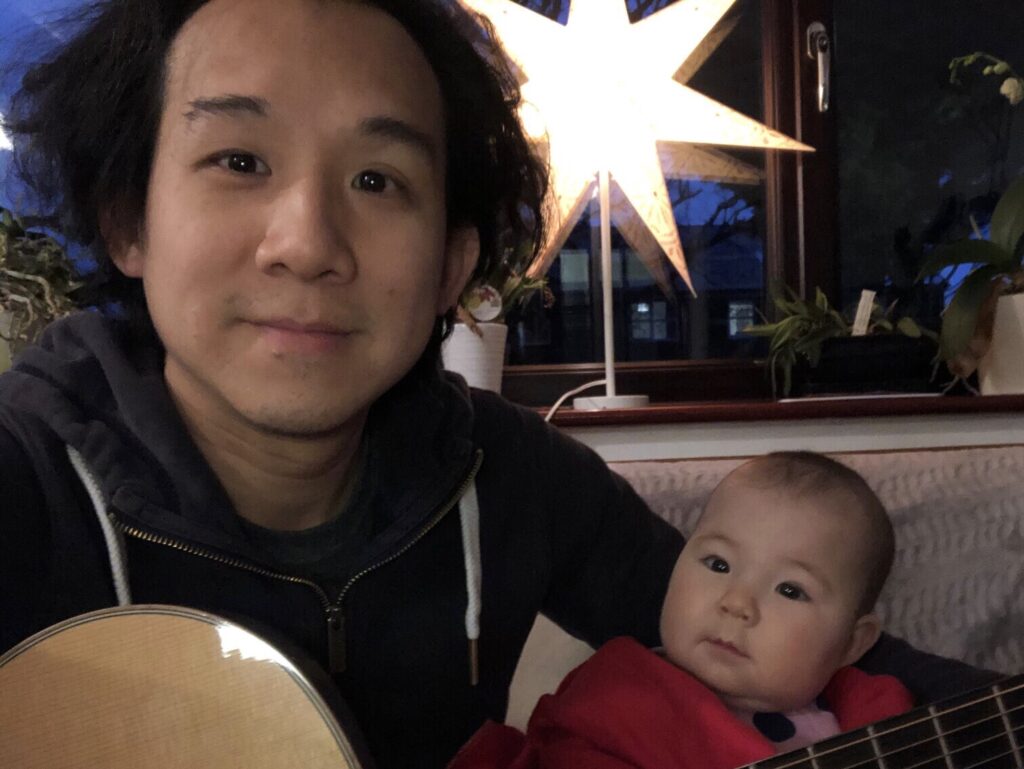This was a commissioned Lent talk for BBC Radio4’s. It was broadcast on 24 February 2021: https://www.bbc.co.uk/programmes/m000sh9h
It has been shortlisted as a finalist for the Sandford St Martin’s Awards 2022.

Dear Lydia,
Sleeping peacefully in my arms, you are our ray of sunshine, our bundle of joy, our beacon of hope. Outside our embrace however, the world seems far less hopeful. See, you were born in the middle of a pandemic. COVID19 has ravaged our social landscape, torn apart the fabric of our society, and robbed us of many things we have taken for granted.
Daddy is an anaesthetics and intensive care doctor. He has been caring for the sickest patients, whose bodies are unable to support their own lives. Your silent breaths are a tranquil breeze compared to theirs. They all need help from a machine for what you do so effortlessly. Your scent, and that milky breath. They are an intoxicating escape from the fetid stench of near-death worn by the critically ill. As I hold your fragile frame in my arms, the warmth re-ignites a flame within me, daily extinguished by the tepid, diaphoretic skin I touch through gloved hands. Some may remain in this state for weeks, organ by organ slowly succumbing to the death grip of infection, all while we try to support the basic functions of life. You see, almost half of the patients I see will die of this dreadful disease.
When you were still in the womb, Mummy and I argued about whether I should stay apart from the family. Several colleagues had already made that decision. Some stayed apart, others sent the kids to their grandparents. We were all afraid of bringing the virus home from work. But I could not face it. I did not know how to cope if I could not come home to Mummy and your sister Miriam. I needed to hug, to touch, and to cry with them. So I made sure I took extra sets of clothes to work. I showered with antiseptic solution after each shift. I even changed my socks and underwear before I cycled home. I went straight to the bathroom to wash my hands when I got home. Only then did I kiss Mummy and Miriam. It was strange, but a minor sacrifice, compared to many families who stayed apart.
A few weeks before you were born, I stood outside a bay and looked at two particular patients. Both were ventilated by machines. Both needed multiple drugs. Both were fighting for their lives. One was a junior doctor. His name was Paul. He was a few years younger than me. He was working on a respiratory ward looking after COVID patients. He did not have full protective equipment, so became a victim himself. The other patient was John. He was my age. He was a father of two, just like me. Taking care of a critically ill patient the same age as me is disconcerting. Taking care of a colleague on ICU is excruciating. Daily I was reminded of my own fragile existence. I was confronted by the sheer injustice of this disease, its seeming irreverence for age, class or health status, its uninhibited pattern of transmission and its propensity to cause such disruption. Many colleagues are already burnt out from the stress, the uncertainties, and the unrelenting torrent of critically ill patients. I too have suffered. Mama will tell you how I was grumpy for days. I lost my temper and shouted at your sister. My jaw began to hurt and lock from stress. I struggled to eat. Many things seemed meaningless, and I found little joy, even at home. Indeed, the uncertainties are numerous. Questions relate to admission, like: Who should come to ICU? What are their chances of survival? What might their quality of life be after survival? Other questions are based around treatment. Should we support this organ? What is the balance between risk and benefit for an invasive procedure? How can we prevent complications of our artificial manipulation of physiology? Still other questions relate to communication. Should we allow visitors? How do we convey severity without instilling panic? How can we provide hope without false optimism? In the Christmas video from the Intensive Care Society last year, ICU survivors shared their messages of thanks for the ICU teams who saved their lives. It was a powerful reminder of why we continue to do what we do. Through their encouragement, these survivors gave us hope, urging us to keep going, giving us a glimpse of life beyond near-death, providing us with sustenance through what many of us perceive as our professional wilderness.
I realised that hope was there in the midst of the uncertainties. It was not just the sophisticated machinery or the complex monitoring. Hope was standing beside each of the patients’ beds. Hope was the nurse, the healthcare assistant, and the doctor. It was the sore upon our noses, the band across our foreheads and the sweat on our scrubs, all from the protective equipment we don. Hope was possessing the perseverance to care, despite the scars in our heads, the bitter taste of injustice, and the nails in our hearts. And it was why we went home after each shift, to a full or empty house.
You will be at least a year old before you even get to see your grandparents. I know they are yearning to hold you, but they are overseas. 爷爷 and 奶奶 are in Singapore, and Opa and Oma are in Germany. The virus has caused severe travel restrictions, so they are unable to come. My patients’ loved ones also long to see them again. The wife for her husband, the child for their parent, the parent for their child. They ache with longing. They wait, as Anatole Broyard suggested during his encounter with critical illness, “more intensely than a lover”. Patiently they hope once again to have and to hold. So we wait, as they wait, and we hope, as they hope. For without faith and without hope, we would not accept our patients. It is because of hope that we contravene the Hippocratic oath to “do no harm”. We insert the needles into wrists for precise blood pressure monitoring, and larger drains into chests to release pressure on the lungs. We force long tubes into throats, and make holes into necks for tracheostomies. We use potent drugs which sometimes cause terrifying alterations of consciousness. Our methods may seem brutal, but it is sometimes through such life sustaining treatment that recovery is facilitated. Similar were some of the wounds inflicted upon Christ at the crucifixion. But while our use of sedation and anaesthesia allows patients to tolerate such procedures, Christ had none. Yes, without hope, intensive care makes little sense, and what we do is torture. But if our human hopes are hung on such invasive modalities, what brighter hope should we have in the death and resurrection of Jesus Christ? From that vantage, Isaiah’s vision was indeed enlightening when he wrote, “by his wounds we are healed”.
For most loved ones, their wait is not indefinite, but the reunion is often framed within unexpected contexts. As TS Eliot puts, “their beginning was their end, and their end was their beginning” (East Coker). Paul recovered from COVID and was eventually discharged from ICU, and then from the hospital. He went home to be with his parents. But the end of his illness was the beginning of another journey. For the scars of survivorship are not always visible. ICU survivors take months if not years to regain physical function, rebuild relationships, reorganise priorities and recover from psychological trauma. John’s reunion with his wife was due to a more divergent reason. He was dying. While we stopped visitors to the ICU for risk of spreading infection, we also recognised the unmeasurable agony of dying alone. So they reunited, till death did them part. The beginning of his illness journey was his end. And as he breathed his last, his end was also a beginning. Left behind was the widowed mother of two, who had her own grief to overcome and a new chapter of life to navigate. As a secondary victim of critical illness, her challenges were not dissimilar to those of other ICU survivors. She had to rebuild her own life. Her relationships would never be the same. She had to continue to love her children, when the love of her life was extinguished.
I do not know why John died and Paul did not. We still do not fully understand the susceptibility to symptoms, nor the predisposition to severity. But even though I am confronted by death everyday, I am also surrounded by hope. Hope that is not confined to the beginning or the end of an illness. As I reflect on the sacrifices made by healthcare workers, and those made by patients, I am reminded of the long history of personal sacrifice within medicine. The Byzantine Christians, disregarding their own safety, cared for victims of the plague. This, along with the formation of hospices, developed into the specialty of palliative care. Henry Dunant, who witnessed the horrors of the battle of Solferino, spent his wealth and energy during later life campaigning for humanitarianism, culminating in the formation of the Red Cross. Within this pandemic, the hundreds of healthcare workers who have died from COVID stand testament to the undying hope we hold for a better future. Healthcare professionals continue to work despite the adversities, uncertainties and insufficiencies. Scientists have had years worth of work and funding disrupted, but their efforts despite this forced directional change have brought us hope in the vaccine. Numerous drug trials have already identified several treatment options to reduce mortality. Though the deaths of patients are etched in my memory, I carry on, knowing that our work is one of hope. Each patient I admit, I hope, along with their loved ones, that they will live. But for those who do not, I echo what the late Professor Jay Katz wrote, “we cannot resurrect the dead, but we can learn from their suffering”.
My dear Lydia, the world you were born into may seem daunting. It is often confusing, occasionally frustrating and sometimes seems hopeless. You will sometimes feel pain, and you might endure suffering, but life really isn’t “the curtain descends, everything ends, too soon, too soon.” (Speak Low — Billie Holliday [original by Kurt Weill]). On finishing a shift one morning as the on-call anaesthetist for maternity, I became acutely aware of the hope which shines through birth. Through your birth, we left behind the sufferings and sacrifices of pregnancy. We moved on from the fact that Daddy was not allowed to attend antenatal appointments or scans. We rejoice in the gift of new life. In the global narrative of many endings, you are indeed a new beginning. And as Easter approaches, remember that the darkest ending was also followed by the brightest beginning. So as you grow up, never forget the sacrifices made so that we may live and have a better future. Never forget the blood of Christ that gives us hope. Never forget the light which shines through the darkness, and is not overcome by it.
Love, Daddy
This piece has been shortlisted as a finalist for the Sandford St Martin’s Awards 2022.



[…] Letter to Lydia […]